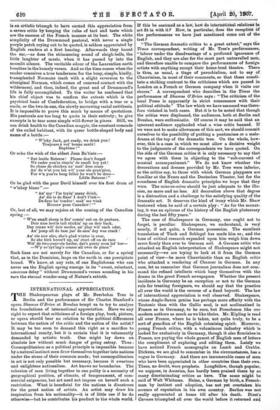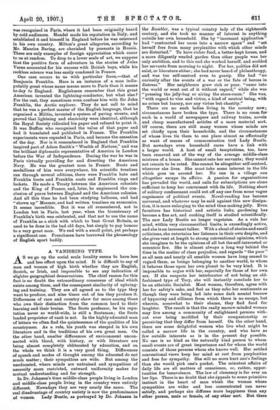INTERNATIONAL APPRECIATION.
Pr HE Shakespearean plays of Mr. Beerbohm Tree in
Berlin and the performance of Sir Charles Stanford's opera Shamus O'Brien at Breslau tempt us to try to analyse the foundations of international appreciation. Have we any right to expect that criticisms of a foreign play, book, picture, or opera should bear no relation to the political differences between the nation of the critic and the nation of the artist ? It may be too soon to demand this right as a sacrifice to international comity, but it is certain that it is vehemently demanded by artistic truth. One might lay down an absolute law without much danger of going astray. Thus : Cosmopolitanism as a political principle is impossible because by a natural instinct men draw themselves together into nations under the stress of their common needs ; but cosmopolitanism
• in art is not only possible but necessary, because it sweetens and enlightens nationalism. Art knows no boundaries. The cohesion of men living together in one polity is a necessity of geographical position, pf climate, of temperament, of com- mercial exigencies, but slit need not impose on herself such a restriction. What is beneficial for the nations is disastrous for the great nation of artists. An artist may draw his inspiration from his nationality—it is of little use if he do otherwise—but be contributes his product to the whole world.
If this be assumed as a law, hoe/ do international relationd In art fit in with it ? How, in particular, does the receptidzi hf the performances we have just mentioned come out of the test P "The German dramatic critics to a great extent," says the Times correspondent, writing of Mr. Tree's performances, " labbur under the disadvantage of a profound ignorance of English, and they are also for the most part untmvelled men, and therefore unable to compare the performances of foreign artists with anything except their home-bred theatre. There is thus, as usual, a tinge of parochialism, not to say of Chauvinism, in most of their comments, so that these consti- tute a striking contrast to the criticisms which are passed in London on a French or German company when it visits our shores." A correspondent who describes in the Times the performance of Shamus O'Brien says "The criticism of the local Press is apparently in strict consonance with their political attitude." The law which we have assumed was there- fore violated in both cases. But it is to be noted that though the critics were displeased, the audiences, both at Berlin and Breslau, were enthusiastic. Of course it may be said that an ignorant audience applauded what a wise critic banned. If we were not to make allowances of this sort, we should commit ourselves to the possibility of putting a pantomime or a melo- drama at the top of the dramatic tree. On the whole, how- ever, this is a case in which we must allow a decisive weight to the judgments of the correspondents we have quoted. On the Bide of the German critics it is only necessary to say that we agree with them in objecting to the " sub.current of musical accompaniment." We do not know whether the decorations and dresses provided by Mr. Tree were inferior, as the critics say, to those with which German playgoers are familiar at the Neues and the Deutsches Theater, but for the soundness of English dramatic principles we hope that they were. The min-en-seine should be just adequate to the illu- sion, no more and no less. All decoration above that degree is a distraction and a challenge to the satisfying quality of the dramatic art. It deserves the kind of irony which Mr. Shaw bestowed when he said of a certain play "As for the mount- ing, it was an epitome of the history ol the English plutocrady during the last fifty years."
The case of Shakespeare in Germany, one ought not to forget, is peculiar. Shakespeare, we understand, is very nearly, if not quite, a German possession. The excellent translation of Tieck and Schlegel has made him so ; and the tons of critical research expended upon him weigh him down more firmly than ever to German soil. A German critic who attacked an English interpretation of Shakespeare might not necessarily—we are trying to look at it from the German point of view—be snore Chauvinistic than an English critic who attacked a rendering of Chaucer in German. In any case, let us remember that German journalism does not oom- mand the refined intellects which busy themselves with the drama in the great French newspapers. Whether the present incidents in Germany be an exception or not to the German rule for treating foreigners, we should say that the practice all over the world is the reverse of a fixed boycott. The law of international appreciation is well observed. Shakespeare, whose Anglo-Saxon genius has perhaps more affinity with the Teutonic than with the Gallic soul, is not acclimatised in France as in Germany, to be sure, but Frenchmen. like our modern authors as much as we like theirs. Mr. Kipling is read all over France, where he is taken, hot quite truly, to be a sort of guardian of the English colonising spirit. Moreover, young French critics, with a voluminous industry which 'is looked for exclusively in Germany, though it also flourishes in France, are paying the whole gamut of English men of letters the compliment of exploring and editing them. Lately we have noticed French monographs on Lamb and Crabbe. Dickens, we are glad to remember in the circumstances, has a vogue in Germany. And there are innumerable cases of men who have been appreciated in other countries than their own. These, no doubt, were prophets. Longfellow, though popular, we suppose, in America, has hardly been praised there by so many discriminating critics as here. The same might be said of Walt Whitman. Heine, a German by birth, a French- man by instinct and adoption, has not yet overtaken his arrears of reputation in his own country. Berlioz was -not really appreciated at home till after his death. Bizet's Carmen triumphed all over the world before it returned and was recognised in Paris, where it had been originally heard by cold audiences. Handel made his reputation in IIy, and established it and himself in England before he was esteemed in his own country. Milton's great allegories, according to Mr. Maurice Baring, are cherished by peasants in Russia. These are only examples of foreign appreciation which occur to us at random. To drop to a lower scale of art, we suppose that the positive form of adventure in the stories of Jules Verne accounted for his success with British boys, while his reckless science was less madly condoned in France.
One case occurs to us with particular force,—that of Benjamin Franklin. Here is an instance of a man indis- putably great whose name means more to Paris than it means to-day to England. Englishmen remember that this great American invented the lightning-conductor, but what else P For the rest, they sometimes even confuse him with Sir John Franklin, the Arctic explorer. They do not call to mind that he was a perfect master of the English language, that he organised a Militia, invented a system of paving streets, and proved that lightning and electricity were identical, although the Royal Society ridiculed his paper and refused to print it. It was Buffon who recognised the value of that paper and had it translated and published in France. The Franklin experiments were repeated in Paris, and became the sensation of the day. Nor is it remembered in England that Franklin inspired part of Adam Smith's " Wealth of Nations," and was the brilliant diplomatic representative of America in London before the War of Independence. Daring the war he was in Paris virtually providing for and directing the American Navy. He was the greatest man in France. Busts and medallions of him were everywhere, his scientific treatises ran through several editions, there were Franklin hats and Franklin boots and Franklin coats and Franklin rings and lockets. He made a Treaty between the American colonists and the King of France, and, later, he engineered the con- clusion of peace between England and the American colonies. And all this time he had been studying balloons, and had "shown up" Mesmer, and had written treatises on economics. It seems incredible. But it was all remembered, not in London but in Paris, last year, when the bicentenary of Franklin's birth was celebrated, and that not to use the name of Franklin as a stick with which to beat Great Britain, as used to be done in the bad old days, but simply to pay honour to a very great man. We end with a small point, yet perhaps a significant one. Frenchmen have borrowed the phraseology of English sport bodily.











































 Previous page
Previous page